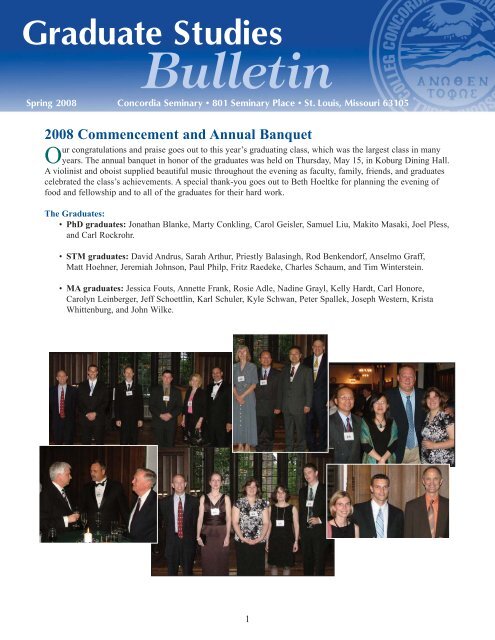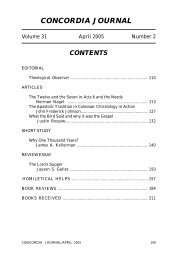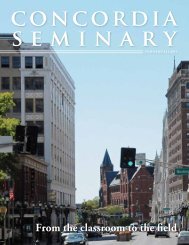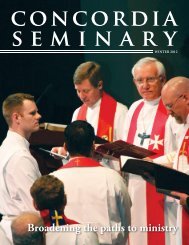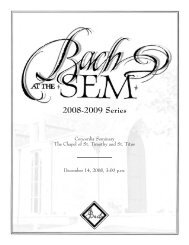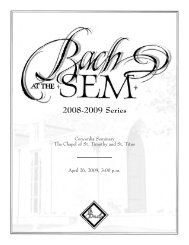spring08:Summer 05.qxd.qxd - Concordia Seminary
spring08:Summer 05.qxd.qxd - Concordia Seminary
spring08:Summer 05.qxd.qxd - Concordia Seminary
- TAGS
- concordia
- seminary
- www.csl.edu
Create successful ePaper yourself
Turn your PDF publications into a flip-book with our unique Google optimized e-Paper software.
Graduate Studies<br />
Bulletin<br />
Spring 2008 <strong>Concordia</strong> <strong>Seminary</strong> • 801 <strong>Seminary</strong> Place • St. Louis, Missouri 63105<br />
2008 Commencement and Annual Banquet<br />
Our congratulations and praise goes out to this year’s graduating class, which was the largest class in many<br />
years. The annual banquet in honor of the graduates was held on Thursday, May 15, in Koburg Dining Hall.<br />
A violinist and oboist supplied beautiful music throughout the evening as faculty, family, friends, and graduates<br />
celebrated the class’s achievements. A special thank-you goes out to Beth Hoeltke for planning the evening of<br />
food and fellowship and to all of the graduates for their hard work.<br />
The Graduates:<br />
• PhD graduates: Jonathan Blanke, Marty Conkling, Carol Geisler, Samuel Liu, Makito Masaki, Joel Pless,<br />
and Carl Rockrohr.<br />
• STM graduates: David Andrus, Sarah Arthur, Priestly Balasingh, Rod Benkendorf, Anselmo Graff,<br />
Matt Hoehner, Jeremiah Johnson, Paul Philp, Fritz Raedeke, Charles Schaum, and Tim Winterstein.<br />
• MA graduates: Jessica Fouts, Annette Frank, Rosie Adle, Nadine Grayl, Kelly Hardt, Carl Honore,<br />
Carolyn Leinberger, Jeff Schoettlin, Karl Schuler, Kyle Schwan, Peter Spallek, Joseph Western, Krista<br />
Whittenburg, and John Wilke.<br />
1
’07-’08 Prospectuses, Proposals, and Dissertations<br />
This year the Graduate School was pleased to see the successful submission of four prospectuses, three proposals,<br />
and four dissertations.<br />
Prospectuses:<br />
• Jeff Dukeman, “Beyond the Hierarchical and Egalitarian Trajectories: Towards a Word-Centered<br />
Differentiated Social Model of the Trinity Fruitful for Understanding the Translocal Nature of<br />
Congregations”<br />
• Andre Snavely, “A Biblical/Trinitarian Account of Life in the Spirit: True Human Personhood<br />
according to a Post-Constantinian Christological Pneumatology”<br />
• Philip Penhallegon, “The Narrative and Theological Function of the Prayers in Nehemiah”<br />
• Jon Vieker, “‘The Father’s Faith, The Children’s Song’: Missouri Lutheranism Encounters<br />
American Christianity in Its Hymnals and Hymns, 1889–1912”<br />
Proposals:<br />
• Kevin Golden, “The Waves of the Deluge Breaking on Jonah: A Textually Based Methodology for<br />
Intertextuality”<br />
• John Hellwege, “The American Lutheran Theological Interpretations of Pre-War Nazi Germany”<br />
• Larry Lacher, “John Wesley’s Liturgical Revision: A Pattern for Reshaping Worship for Post-Christian<br />
America”<br />
Dissertations:<br />
• Carol Geisler, “An Obedient Defense of Disobedience: The Brothers of the Common Life and the<br />
Boundaries of Religion”<br />
• Makito Masaki, “Luther’s Two Kinds of Righteousness and His Wartburg Postil (1521): How Luther<br />
Exhorted People to Live Christian Lives”<br />
• Carl Rockrohr, “Jesus’ Sacrifice Death in an African Context”<br />
• Joel Pless, “The Doctrine of the Ministry in the Writings of George Stoeckhardt”<br />
Finishing Strong—Thoughts from Dr. R. Lessing<br />
1 Kings 11:3 states of Solomon, “He had seven hundred wives of royal birth and three hundred<br />
concubines, and his wives led him astray.”<br />
This brings to mind the old adage, “It’s easy as pie to begin; it’s tougher than nails to finish.” Pick your pie;<br />
it seems that easy for Solomon. Pretenders to the throne Amnon, Absalom and Adonijah had been hosed.<br />
Enemies of the throne Joab, Abiathar and Shimei had been slam-dunked. Anointed as king of Israel by Zakok<br />
at the Gihon Spring, Solomon came out of the starting blocks like a greyhound after jack-rabbits. All the<br />
money was on Solomon, the tenth of David’s seventeen sons.<br />
In 1 Kings 3:7 he calls himself a kid, but we would say Solomon was a kid wonder. He spoke 3,000<br />
proverbs and his songs numbered 1,005. He described plant life from the cedars of Lebanon to the hyssop that<br />
grows out of walls. He gained control of two main international trading routes; the Via Maris along the<br />
Mediterranean Coast and the King’s Highway that connected Elath to the south with Damascus to the north.<br />
The result was 1 Kings 4:25: “From Dan to Beersheba, Judah and Israel lived in safety, each man under his<br />
own vine and fig tree.”<br />
2
Solomon didn’t need any lessons in Greek or Hebrew, lectures on eschatology or angelology, Latin, nor<br />
German. If there was ever a sure-fire candidate for success it was Solomon! For the first ten chapters of 1 Kings<br />
he’s awesome! But 1 Kings 11:3 says, “He had seven hundred wives of royal birth and three hundred concubines,<br />
and his wives led him astray.”<br />
It is relatively easy to begin a graduate degree. I see it all the time; so do you. Students begin with unbridled<br />
enthusiasm, high energy, and a never-say-die spirit. Like hot knives into butter, they tear into new classes, language<br />
exams, and comprehensive tests. But then there is a setback, or two … or three (call it the Proposal<br />
Hearing?). And discouragement sets in. “It’s easy as pie to begin; it’s tougher than nails to finish!”<br />
So how did so many finish this month? One reason comes from Matthew 12:42 – “One greater than<br />
Solomon is here.” This King began strong and he finished even stronger. And for him it was tougher than nails.<br />
Because, in addition to the nails, there was scourging, mocking, spitting, beating, slapping, sweating, bleeding<br />
and crowing with thorns. Still, he finished; in spite of his disciple’s kiss of betrayal, in spite of his friends running<br />
for cover, in spite of his countrymen clamoring for his death, and in spite of his Father’s abandonment.<br />
If the life of Solomon, David’s great Son goes to show it’s easy as pie to begin. Then the life, death, and resurrection<br />
of Jesus Christ, David’s greatest Son, proves that he finished for us though it was tougher than nails.<br />
Dear students, “Since we are surrounded by such a great cloud of witnesses ... Let us run with endurance the<br />
race marked out for us. Let us fix our eyes on Jesus, the Beginner and Finisher of our faith, who for the joy set<br />
before him endured the cross, scorning its shame, and sat down at the right hand of the throne of God. Consider<br />
him who endured such opposition from sinful men so that you will not grow weary and lose heart.” (Heb.12:1-3)<br />
In this cloud of witnesses is Moses; Moses who registered last for classes and got Advanced Obscurity,<br />
Remedial Waiting, Loneliness 101, and Introduction to Working for Your Father-In-Law for 40 Years. But he<br />
finished strong. At the end of his life, Deut. 34:7 –“Moses was 120 years old when he died, yet his eyes were<br />
not weak nor his strength gone.”<br />
Also in this cloud is Joshua, surrounded by ten spies, who needed a check-up from the neck up, whose first<br />
assignment was a forty-year stint in the Sinai desert; but he finished strong. At the end, Joshua 24:15 –”Chose<br />
this day whom you will serve. As for me and my house we will serve Yahweh.” And then these words for the<br />
ages – “Five times I received from the Jews forty lashes minus one, three times I was beaten with rods, once I<br />
was stoned, three times I was shipwrecked, J spent a night and a day in the open sea.” In the dark, dank,<br />
Mamertine Prison in Rome, Paul finished strong. 2 Tim. 4:7 reads, “I have fought the good fight, I have finished<br />
the course, I have kept the faith.”<br />
Finishing strong doesn’t mean finishing first—it doesn’t mean finishing without blood, sweat and tears. And<br />
it doesn’t always mean finishing on time. Finishing strong means personal discipline, a love for learning, and a<br />
strong desire to improve the gifts God has given you. Finishing strong also means claiming this promise: “He<br />
who began a good work in you, will finish it on the day of Christ Jesus” (Phil 1:6).<br />
This month we celebrate with those whose work at <strong>Concordia</strong> <strong>Seminary</strong> is finished, even as we encourage<br />
those who still labor toward the completion of their degrees. If you are finished — Sing hallelujah! If you are<br />
still in the race, “do not grow weary or lose heart!” For everything we do is in light of the one who will finish<br />
everything he began. Count on it!<br />
3
2008 Graduate to Present at the International Association for<br />
Mission Studies<br />
Newly graduated <strong>Concordia</strong> <strong>Seminary</strong> Ph.D., Carl Rockrohr, has accepted an invitation<br />
to give a sectional paper for the International Association for Mission Studies, which<br />
will hold its twelfth quadrennial international conference at Balaton, Hungary in August<br />
2008. Dr. Rockrohr, a professor of theology at <strong>Concordia</strong> University at Ann Arbor and<br />
chair of its theology department, has entitled his paper “Relationships in Witnessing.” The<br />
paper develops ideas on which Rockrohr worked in his dissertation, “Jesus’ Sacrifice<br />
Death in an African Context.”<br />
Dr. Robert Kolb, Rockrohr’s Doktorvater comments, “Lutheran contributions to<br />
Missiology have been too few in the last generation. Carl’s participation in this conference<br />
is one important step to our making the kind of contacts and giving the kind of witness to<br />
the potential for Lutherans to contribute to the worldwide missiological discussion that is<br />
necessary for Lutherans in our time.”<br />
Student Presentations<br />
Four of our graduate students presented papers at this year’s Annual Central States Regional Meeting of the<br />
Society of Biblical Literature. Tom Hobson presented his paper entitled “Moral Felonies: A Comparison of<br />
the Death Penalty in the Torah with the Penalty ‘Cut Off from (One’s) People.’” Jeffrey E. Brickle presented<br />
“Have You Heard the Text? The Implications of First Century Orality for New Testament Studies” and Beth<br />
Hoeltke presented “Complementary Aspects, Unique Distinctions, and Mutual Gifts of Male and Female in<br />
Reading Genesis 1-2.” At an international law conference at the Royal University of Law and Economics in<br />
Phnom Penh, Cambodia, Cordell Schulten presented the paper “Judaism and the Foundations of American Law.”<br />
Also, David Coe presented “Kierkegaard: Justifications for an Attack upon Christendom” at the 2007 <strong>Concordia</strong><br />
<strong>Seminary</strong> Theological Symposium. Finally, In Hee Cho presented the paper, “The Matthean Theology of the<br />
Death of Jesus Seen Through the Lens of Irony.”<br />
Brickle also presented several other papers. At the Society of Biblical Literature’s Annual Meeting in San<br />
Diego, California, he presented “Oral Design<br />
and Coherence in the Prologue of First John.”<br />
At the Society for Pentecostal Studies in<br />
Durham, North Carolina, his paper “Oral Design<br />
in the Prologue of First John” was presented. He<br />
has also been asked to present at the Society of<br />
Biblical Literature upcoming Annual Meeting in<br />
Boston, Massachusetts and will offer “The<br />
Analysis of Sound Patterns: Exploiting Aural<br />
Exegesis of Ancient Texts.”<br />
Hobson Hoeltke<br />
Cho<br />
Almost Unpacked—Recent Developments for the Graduate<br />
School<br />
On Monday, May 26, the Graduate School offices officially switched locations on campus. Our newly-renovated<br />
offices are located in building J on the first floor. They are offices J-15, 16, 17, and 18. The boxes are<br />
almost unpacked, and we are enjoying the new facilities.<br />
4<br />
Rockrohr
Conference Grants<br />
Beginning with the 2008-2009 academic year, graduate students may apply for a grant of up to $50 when<br />
presenting a paper at local regional conferences and up to $250 for a major or national/international<br />
conference.<br />
Important Dates and Deadlines<br />
• New and returning student registration packets sent to student CSL accounts are due in the middle of July.<br />
• Web Registration for fall classes will be on Monday, August 25.<br />
• New, first-time students will be able to register on Monday, August 25.<br />
• Fall Quarter classes for the ’08-’09 school year will begin on Monday, September 8.<br />
• The Day of Exegetical Reflection is on Monday, September 22 followed by the Theological Symposium<br />
on Tuesday, September 23, and Wednesday, September 24. Call (314) 505-7487 for information about<br />
both events.<br />
• Graduate School winter quarter registration will take place on Monday, October 20.<br />
• Fall quarter ends after classes on Friday, November 14th.<br />
Day of Exegetical Reflection<br />
On Monday, September 22, <strong>Concordia</strong> <strong>Seminary</strong> will host its annual Day of Exegetical<br />
Reflection. The featured speaker is distinguished Paulinist Dr. Thomas R. Schreiner, a<br />
member of the faculty at Southern Baptist <strong>Seminary</strong> in Louisville, Kentucky. For more<br />
information please call (314)505-7487 or e-mail: marrsr@csl.edu. This day is connected<br />
with the Theological Symposium which runs from Tuesday, September 23 to Wednesday,<br />
September 24.<br />
Thomas R. Schreiner<br />
James Buchanan Harrison Professor of New Testament Interpretation (1997); Associate<br />
Dean, Scripture and Interpretation<br />
Schreiner<br />
Education:<br />
• B.S., Western Oregon University<br />
• M.Div., Th.M., Western Conservative Baptist <strong>Seminary</strong><br />
• Ph.D., Fuller Theological <strong>Seminary</strong><br />
Dr. Schreiner joined the Southern Baptist <strong>Seminary</strong> faculty in 1997 after serving 11 years on the faculty at<br />
Bethel Theological <strong>Seminary</strong>. He also taught New Testament at Azusa Pacific University. Dr. Schreiner, a<br />
Pauline scholar, is the author or editor of several books including: Romans; Interpreting the Pauline Letters; The<br />
Law and Its Fulfillment: A Pauline Theology of Law; The Race Set before Us: A Biblical Theology of<br />
Perseverance and Assurance; Still Sovereign: Contemporary Perspectives of Election, Foreknowledge, and<br />
Grace; Women in the Church: A Fresh Analysis of I Timothy 2:9-15; Paul, Apostle of God’s Glory in Christ: A<br />
Pauline Theology; 1 and 2 Peter; Jude and his latest work New Testament Theology: Magnifying God in Christ.<br />
5


